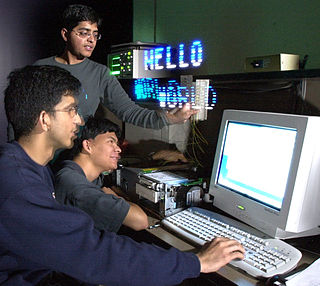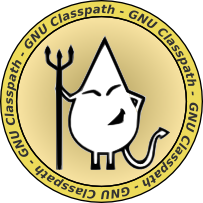| Operating system | Java virtual machine |
|---|---|
| Type | Test Suite |
| License | GNU General Public License |
| Website | www |
Mauve is a project to provide a free software test suite for the Java class libraries. Mauve is developed by the members of Kaffe, GNU Classpath, GCJ, and other projects. Unlike a similar project, JUnit, Mauve is designed to run on various experimental Java virtual machines, where some features may be still missing. Because of this, Mauve does not discover the testing method by name[ clarification needed ], as JUnit does. Mauve can also be used to test the user java application, not just the core class library. Mauve is released under GNU General Public License.
The "Hello world" example in Mauve:
// Tags: JDK1.4publicclassHelloWorldimplementsTestlet{// Test if 3 * 2 = 6publicvoidtest(TestHarnessharness){harness.check(3*2,6,"Multiplication failed.");}}
The GNU Lesser General Public License (LGPL) is a free-software license published by the Free Software Foundation (FSF). The license allows developers and companies to use and integrate a software component released under the LGPL into their own software without being required by the terms of a strong copyleft license to release the source code of their own components. However, any developer who modifies an LGPL-covered component is required to make their modified version available under the same LGPL license. For proprietary software, code under the LGPL is usually used in the form of a shared library, so that there is a clear separation between the proprietary and LGPL components. The LGPL is primarily used for software libraries, although it is also used by some stand-alone applications.

A "Hello, World!" program generally is a computer program that outputs or displays the message "Hello, World!". Such a program is very simple in most programming languages, and is often used to illustrate the basic syntax of a programming language. It is often the first program written by people learning to code. It can also be used as a sanity test to make sure that a computer language is correctly installed, and that the operator understands how to use it.

Java is a general-purpose programming language that is class-based, object-oriented, and designed to have as few implementation dependencies as possible. It is intended to let application developers write once, run anywhere (WORA), meaning that compiled Java code can run on all platforms that support Java without the need for recompilation. Java applications are typically compiled to bytecode that can run on any Java virtual machine (JVM) regardless of the underlying computer architecture. The syntax of Java is similar to C and C++, but it has fewer low-level facilities than either of them. As of 2019, Java was one of the most popular programming languages in use according to GitHub, particularly for client-server web applications, with a reported 9 million developers.
JUnit is a unit testing framework for the Java programming language. JUnit has been important in the development of test-driven development, and is one of a family of unit testing frameworks which is collectively known as xUnit that originated with SUnit.
The GNU Compiler for Java (GCJ) is a free compiler for the Java programming language. It was part of the GNU Compiler Collection for over ten years but as of 2017 it is no longer maintained and will not be part of future releases.
A GPL linking exception modifies the GNU General Public License (GPL) in a way that enables software projects which provide library code to be "linked to" the programs that use them, without applying the full terms of the GPL to the using program. Linking is the technical process of connecting code in a library to the using code, to produce a single executable file. It is performed either at compile time or run-time in order to produce functional machine-readable code. There is a public perception, so far unsupported by any legal precedent or citation, that without applying the linking exception, a program linked to GPL library code may only be distributed under a GPL-compatible license. The license of the GNU Classpath project explicitly includes a statement to that effect.

GNU Classpath is a free software implementation of the standard class library for the Java programming language. Most classes from J2SE 1.4 and 5.0 are implemented. Classpath can thus be used to run Java-based applications. GNU Classpath is a part of the GNU Project. It was originally developed in parallel with libgcj due to license incompatibilities, but later the two projects merged.

Apache Ant is a software tool for automating software build processes which originated from the Apache Tomcat project in early 2000. It was a replacement for the Make build tool of Unix, and was created due to a number of problems with Unix's make. It is similar to Make but is implemented using the Java language, requires the Java platform, and is best suited to building Java projects.
Object Pascal is an extension to the programming language Pascal that provides object-oriented programming (OOP) features such as classes and methods.

BlueJ is an integrated development environment (IDE) for the Java programming language, developed mainly for educational purposes, but also suitable for small-scale software development. It runs with the help of JDK.
Free Java implementations are software projects that implement Oracle's Java technologies and are distributed under free software licences, making them free software. Sun released most of its Java source code as free software in May 2007, so it can now almost be considered a free Java implementation. Java implementations include compilers, runtimes, class libraries, etc. Advocates of free and open source software refer to free or open source Java virtual machine software as free runtimes or free Java runtimes.
Maven is a build automation tool used primarily for Java projects. Maven can also be used to build and manage projects written in C#, Ruby, Scala, and other languages. The Maven project is hosted by the Apache Software Foundation, where it was formerly part of the Jakarta Project.
Apache Harmony is a retired open source, free Java implementation, developed by the Apache Software Foundation. It was announced in early May 2005 and on October 25, 2006, the Board of Directors voted to make Apache Harmony a top-level project. The Harmony project achieved 99% completeness for J2SE 5.0, and 97% for Java SE 6. The Android operating system has historically been a major user of Harmony, although since Android Nougat it increasingly relies on OpenJDK libraries.

The Eclipse Public License (EPL) is a free and open source software license most notably used for the Eclipse IDE and other projects by the Eclipse Foundation. It replaces the Common Public License (CPL) and removes certain terms relating to litigations related to patents.
OpenJDK is a free and open-source implementation of the Java Platform, Standard Edition. It is the result of an effort Sun Microsystems began in 2006. The implementation is licensed under the GNU General Public License version 2 with a linking exception. Were it not for the GPL linking exception, components that linked to the Java class library would be subject to the terms of the GPL license. OpenJDK is the official reference implementation of Java SE since version 7.
IcedTea is a build and integration project for OpenJDK launched by Red Hat in June 2007. IcedTea-Web is a free software implementation of Java Web Start and the Java web browser plugin. IcedTea-Sound is a collection of plugins for the Java sound subsystem, including the PulseAudio provider which used to be included with IcedTea. The Free Software Foundation recommends that all Java programmers use IcedTea as their development environment.
Java Native Access (JNA) is a community-developed library that provides Java programs easy access to native shared libraries without using the Java Native Interface. JNA's design aims to provide native access in a natural way with a minimum of effort. No boilerplate or generated glue code is required.
Mockito is an open source testing framework for Java released under the MIT License. The framework allows the creation of test double objects in automated unit tests for the purpose of test-driven development (TDD) or behavior-driven development (BDD).
Concordion is a specification by example framework originally developed by David Peterson, and now maintained by a team of contributors, led by Nigel Charman.